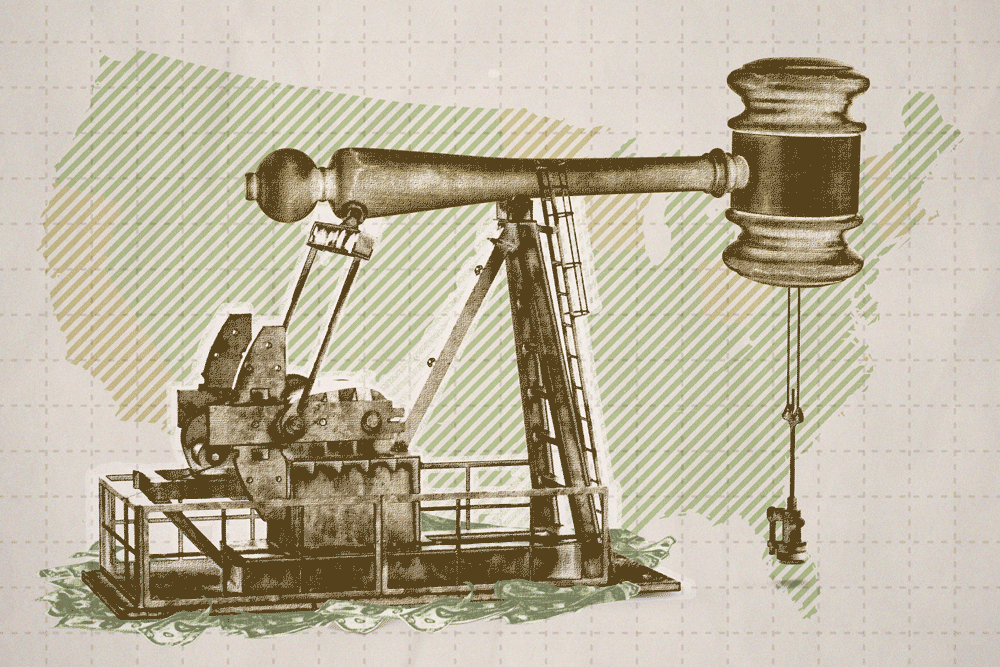States are not just suing oil and gas companies; they are also lodging climate-related lawsuits against food companies.

(Illustration by The Epoch Times, Shutterstock)
By Kevin Stocklin | Epoch Times
As America’s oil, gas, and coal companies struggle under an array of regulations and permitting roadblocks they are also facing new challenges from climate activists in the form of lawsuits, fines, taxes, and shareholder activism from blue-state pension funds.
And increasingly, U.S. states are set against each other, with liberal states leading the charge against fossil fuel companies, while red states attempt to defend them.
Starting in 2018, states including New York, Rhode Island, Massachusetts, Minnesota, Delaware, Connecticut, California, and the District of Columbia began filing lawsuits against energy giants ExxonMobil, Chevron, ConocoPhillips, Sunoco, BP, and others.
Oil companies also face legal action from dozens of cities, including Honolulu, Chicago, Baltimore, New York, Charleston, San Francisco, Oakland, and Boulder.
Analysts say there are multiple goals driving these suits.
“It’s partly ideological, trying to drive these companies out of business,” Kenny Stein, policy vice president at the Institute for Energy Research, told The Epoch Times. Mr. Stein also believes it has to do with consumers’ use of fossil fuels.
“These governments are trying to mandate that people use less oil and less natural gas, but people want to heat their homes as much as they want, they want to drive as far as they want,” Mr. Stein said. “If the state banned the sale of oil the population would revolt, so this is their backdoor way of trying to impose their will.”
Many of the climate lawsuits assert that pollution caused by oil companies created a “public nuisance” and the companies intentionally deceived the public about the harmful impact when they caused global temperatures to rise.
Activist organization Climate Analytics tried to calculate the alleged damages.
“Between 1985 and 2018, we estimate partial damages of the combined CO2 emissions from 25 companies—oil and gas carbon majors—of about $20 trillion USD,” Climate Analytics states.
Meanwhile, Vermont on May 30 became the first state to pass a law that forces oil companies to pay for damage caused by “extreme weather events,” such as floods. According to this law, Vermont will tally the cost to residents of extreme weather events over the past 30 years, and any company that has released more than one billion metric tons of CO2 between 1995 to 2024 will be forced to pay its share of that cost into a state climate superfund.
But it’s not just about money.

“This is simply a strategy for the left to accomplish what they’ve been unable to do in Congress through the ballot box,” Alabama Attorney General Steve Marshall told The Epoch Times, “and that is to implement a nationwide climate policy that’s consistent with their green agenda.”
Mr. Marshall and 18 other attorneys general—all from red states—appealed to the Supreme Court on May 22, asking the justices to rule on whether individual states and cities can “assert the power to dictate the future of the American energy industry.
“Their actions imperil access to affordable energy everywhere and inculpate every State and indeed every person on the planet,” the attorneys general wrote. “Consequently [they] threaten not only our system of federalism and equal sovereignty among States, but our basic way of life.”
States are not just suing oil and gas companies; they are also lodging climate-related lawsuits against food companies.
In February, New York Attorney General Letitia James sued JBS USA Food Company, a U.S. subsidiary of the Brazil-based JBS Group, the world’s largest meat processor, alleging that the firm misled the public about its environmental impact and that “beef production emits the most greenhouse gasses of any major food commodity.”
The Climate Litigation Industry
The potential for enormous payouts from these lawsuits has attracted not only a seemingly endless supply of plaintiffs, but also numerous law firms and even wealthy investors who are placing bets that the lawsuits will succeed.
The plan to potentially wrest trillions of dollars out of energy companies has been developing for more than a decade. A 2012 workshop hosted by the Climate Accountability Institute sought to draw on prior successes that states had in suing tobacco companies.
A post-conference recap of the workshop stated that the group had fostered “an exploratory, open-ended dialogue about whether we might use the lessons from tobacco-related education, laws, and litigation to address climate change.”
Under the tobacco settlement, the companies agreed to make annual payments to states in perpetuity, summing to at least $200 billion within the first 25 years, so long as cigarettes are sold in the United States.
Over the past decade, an entire industry has emerged to bring the climate litigation plan to fruition on multiple fronts, and to raise millions of dollars to fund it.

A tug of war over jurisdiction has ensued between the states and the oil companies, with the companies pressing to defend themselves in federal courts and states fighting to have the cases remain within their borders.
“If you’re the state of California, you want a liberal judge hearing your argument about these cases,” Mr. Marshall said. He argued that federal courts are the appropriate forum to decide on national issues and to provide “a fair opportunity for both sides to be heard.”
In a victory for blue states, however, the U.S. Supreme Court in April 2023 declined appeals by oil companies seeking to move the cases from state to federal court.
According to Mr. Stein, these lawsuits are unlikely to survive in federal courts, given the paucity of evidence tying specific weather events affecting states, such as floods to CO2 emissions, but also the challenge of quantifying the specific contributions of energy companies, given all the other endeavors that emit CO2, such as farming, animals, and people breathing.
“When you’re using political slogans to try and blame a company for something, you can talk in generalities, but when you’re going to try to charge somebody money in a court of law, you have to be able to defend that charge,” he said.
“The actual attribution of trying to claim that a certain amount of damages were caused by a certain oil company, the evidence just doesn’t exist for that.”
Whether the majority of these cases succeed on their merits could prove to be beside the point, however. A report on climate litigation published by Yale Law School states that “the litigants are hoping to find one judge in one state in one courtroom that sees a path to allowing these cases to go to trial.
“Once you get to that point—where you’re past preliminary motions and you’re heading toward discovery and trial—it’s a very different balance of power between the litigants,” the report states. “The plaintiffs can start asking for documents and can start constructing a narrative about what the industry knew and how it acted in the face of that knowledge.”
Teaching Judges About Climate
Climate activists have also developed an advocacy network to instruct judges on the merits of climate lawsuits. One such effort is the Climate Judiciary Project (CJP), founded in 2018 by the Environmental Law Institute (ELI).

The project “provides unbiased, objective continuing education courses to judges about climate science and the law,” Nick Collins, ELI communications director, told The Epoch Times.
ELI reports that it has trained more than 3,000 judges across 28 countries since 1990. CJP trained more than 400 judges in 2022 alone, according to its annual report, and developed a program for select judges to play a leadership role within the judiciary system.
“The judges came away [from the Judicial Leaders in Climate Science program] steeped in facts about the science of climate change, deeply impressed with their consequences, and committed to working together and reaching out to fellow judges to convey what they had learned,” the report stated.
If climate litigation succeeds, the expense will most likely be borne by everyday consumers in the form of higher prices for gasoline, electricity, and home heating. While the skyrocketing cost of cigarettes may have encouraged people to quit smoking, a viable alternative to oil, gas and coal, which currently supply about 80 percent of Americans’ energy needs, has not yet emerged.
“These companies aren’t going out of business; both oil and natural gas are going to continue to be used for a very long time,” Mr. Stein said. “What will ultimately happen is that these companies are just going to have to raise prices to account for the legal costs.”
‘Shrinking’ Exxon
Beyond the courtroom, climate activists are also seeking to leverage the corporate shares owned by state pension funds to force changes within oil and gas companies.
The most recent example of this was an effort at the end of May by blue-state pension funds, led by the California Public Employment Retirement System (CalPRS), and joined by the states of New York and Illinois.
The states demanded to replace the entire board of Exxon Mobil after its management blocked a proposal by climate activists, such as Arjuna Capital and Follow This, that would have committed the oil and gas company to curbing greenhouse gas emissions and shrinking the size of the company.

CalPRS, America’s largest state pension fund, has been known to throw its weight behind progressive causes when voting its corporate shares.
Alabama State Auditor Andrew Sorrell wrote in an op-ed: “While it is unfortunate for Exxon to continually deal with political shareholders uninterested in the future growth of the company, the biggest losers are the pensioners who rely on their public officials to make investment decisions that will yield good returns to fund their retirements.”
Nineteen red state financial officers also expressed opposition, in some cases getting their own state funds to cast votes against CalPRS.
“This is really an unprecedented and ridiculous move to attack the core business of Exxon, which by the way provides $145 million of revenue to the state of Louisiana through taxes,” Louisiana State Treasurer John Fleming, who led the movement against CalPRS, told The Epoch Times. “This would be damaging to households all across the country.”
Shareholders ultimately rejected CalPRS’s attempt, but the battle is far from over.
“If they continue efforts like this, they could begin to reach critical mass, or even if they only have a sizable minority, they can influence positions on these boards and leadership, so I think it’s a very dangerous and destructive thing,” Mr. Fleming said.



